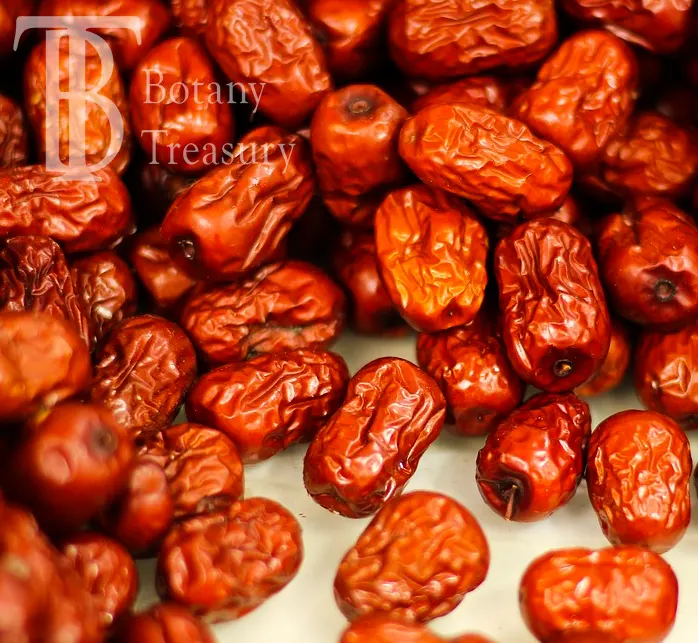
Jujube fruit (Ziziphus jujuba)
Jujube, is a type of fruit that originates from the Jujuba tree (Ziziphus jujuba). Native to Asia, this ancient fruit has been consumed for thousands of years due to its numerous health benefits and versatility in culinary applications. The fruit is characterized by its small size, brown or reddish-brown color, and a sweet, slightly tart taste. Jujube is rich in antioxidants, vitamins, and minerals, making it a popular ingredient in traditional medicine and a sought-after ingredient in modern health and wellness practices.
The active ingredients of jujube include:
- Phenolics: These compounds are known for their antioxidant and antimicrobial properties.
- Flavonoids: These bioactive compounds are associated with antioxidant, anti-inflammatory, and neuroprotective activities.
- Triterpenic acids: These compounds have been found to have antioxidant and anti-inflammatory effects.
- Polysaccharides: These complex carbohydrates have been linked to antioxidant, anti-inflammatory, and immunomodulatory activities.
- Nucleotides: These compounds have been identified as potential bioactive ingredients for their neuroprotective and antioxidant effects.
- Alkaloids: These compounds have been explored for their antiviral, sedative, and neuroprotective properties.
- Saponins: These bioactive compounds have been found to have antioxidant and anti-inflammatory effects.
- Hydroxybenzene: Hydroxybenzene is associated with antioxidant, anti-inflammatory, and neuroprotective activities.
- Vitamin C and Potassium: Jujube is a good source of vitamin C and potassium, making it a nutritious addition to a balanced diet.
- Folic Acid and Zinc: The fruit contains folic acid, which supports fetal development, and zinc, which is essential for various bodily functions.
These active ingredients contribute to the fruit’s diverse pharmacological activities, including antioxidant, anti-inflammatory, anticancer, anti-hyperglycemic, anti-hyperlipidemic, immunomodulatory, neuroprotective, sedative, and antiviral effects.
Here are some of the key health benefits associated with jujube:
- Antioxidant Activity: Jujube is rich in antioxidant compounds such as flavonoids, polysaccharides, and triterpenic acids, which help protect against oxidative stress and inflammation.
- Anti-Inflammatory Effects: The fruit’s antioxidant properties also contribute to its anti-inflammatory effects, which can help alleviate conditions like inflammatory bowel disease and arthritis.
- Immune System Support: The fruit’s polysaccharides and other bioactive compounds may help boost the immune system and fight against cancer cells.
- Neuroprotective Effects: Jujube has been found to have neuroprotective activities, including protecting neuronal cells against neurotoxin stress, stimulating neuronal differentiation, and promoting memory and learning.
- Anxiety and Insomnia Relief: The fruit and its extracts have been traditionally used to treat anxiety and insomnia, with some studies suggesting anti-anxiety and sedative effects.
- Heart Health: Jujube’s anti-inflammatory and antioxidant properties may help keep blood pressure at healthy levels and support overall cardiovascular health.
- Cholesterol Management: The fruit’s bioactive compounds may also help manage cholesterol levels and reduce the risk of heart disease.
- Digestive Support: Jujube has been used as a digestive aid and appetite stimulant, with some studies suggesting it can provide protection against inflammatory bowel diseases like Crohn’s disease and ulcerative colitis.
Overall, jujube is a nutritious fruit with a wide range of health benefits, from antioxidant and anti-inflammatory properties to potential applications in cancer prevention and treatment, neurological health, cardiovascular health, and digestive health.
Botany Treasury exports high-quality jujube. If you are interested in purchasing jujube, please contact us.
Here are some of the different names for jujube:
Regional Names
- Arabic: annab, aunnabe-hindi, aunnabehindi, ennab, unnab, unab, nabec, nabig, nabiq, sidr, zenzeli.
- Chinese: da zao, Beijing mi zao, hei zao, hei tsao, hong zao, hung tzao, peiching mi tzao, suan zao ren, tzao, wu he hong zao, wu ho hung tzao, zao, zao shu.
- Czech: cicimek datlový, Čínská datle, jujuba.
- Danish: almindelig jujube, brystbærtræ.
- Dutch: jujubeboom.
- Eastonian: harilik kreektürn.
- Finnish: kiinanjujuba.
- French: circoulier, dattier de Chine, Guindanlier, jujube de Chine, jujubier, jujubier de Chine.
- German: Brustbeerbaum, Brustbeere, Chinesische Dattel, Chinesische jujube, Domjujube, Jujube, Judendom, Rote Dattel.
- Greek: tzintzola.
- Hungarian: cicimek datlový, Čínská datle.
